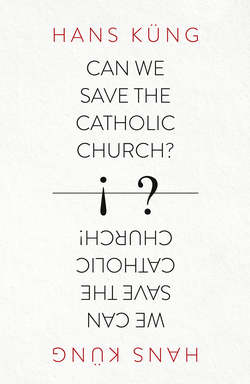Читать книгу Can We Save the Catholic Church? - Hans Kung - Страница 20
Seven Reactions to the Illness of the Church
ОглавлениеEvery Christian, man or woman, and, all the more, every theologian, needs to face this question. Millions of Catholics do not agree with or approve of the course charted by the Church. In all, I identify seven different reactions to the current situation, but I consider the first four of them to be out of the question:
1. One can leave the Church, as tens of thousands of people have done because of the scandalous revelations. As I mentioned previously, the figures for Germany were around 250,000, and in Austria (based on a projection by Cardinal Schönborn) the numbers were approximately 80,000.
2. One can create a schism within the Church by seceding together with a group of other people, as the reactionary former archbishop Marcel Lefebvre (excommunicated in 1988) did with his traditionalist Fraternity of St Pius X. However, it should be noted that not a single reform-minded group has done this to date.
3. One can retreat into a state of inner emigration and remain silent. Many previously reform-minded persons have done this; giving up in frustration, they remain in the Church, but cease to be involved: ‘It is all to no avail, the system simply cannot be reformed!’ And so, everywhere, fewer and fewer high-profile people are prepared to offer resistance.
4. One can outwardly conform but privately hold dissenting opinions. This is the path pursued by people who are willing outwardly, at least, to toe the prevailing line whatever direction it takes. In particular, it is the course taken by conformist politicians, who place great store on maintaining good relationships with the institutional Church and enjoy sitting in the first row at church conventions and papal appearances, and who flatter the church hierarchy outwardly but voice their objections to official doctrines or ethics only in private or not at all.
But three other reactions are also observable, all of which I consider to be important and helpful:
5. One can get involved in the local church community and work together with the local pastor and others, disregarding the popes and bishops. Alternatively, as increasing numbers of men and women who want to remain involved are doing, one can take over, officially or unofficially, some of the tasks of the absent priests.
6. One can protest publicly, and vigorously demand reforms on the part of the ecclesiastical leadership. Unfortunately, the number of involved people who are willing to criticize the Church openly in this way has been dropping continually in the face of the massive resistance offered by the Roman Catholic establishment. Even the organized reform movements now suffer from a shortage of active supporters and especially from the lack of young people willing to get involved.
7. One can study the situation academically and publish the findings, hoping that these publications will inspire and guide individual church members and communities. That is what those theologians are doing who have not simply given up in despair or retreated to their comfortable academic ivory towers, but instead continue to take seriously their responsibilities as teachers (cf. 1 Corinthians 12:28 ff.). This is where I see my own special duty as a teacher of theology.
No less important, however, is the question: how have the bishops reacted to the situation?
